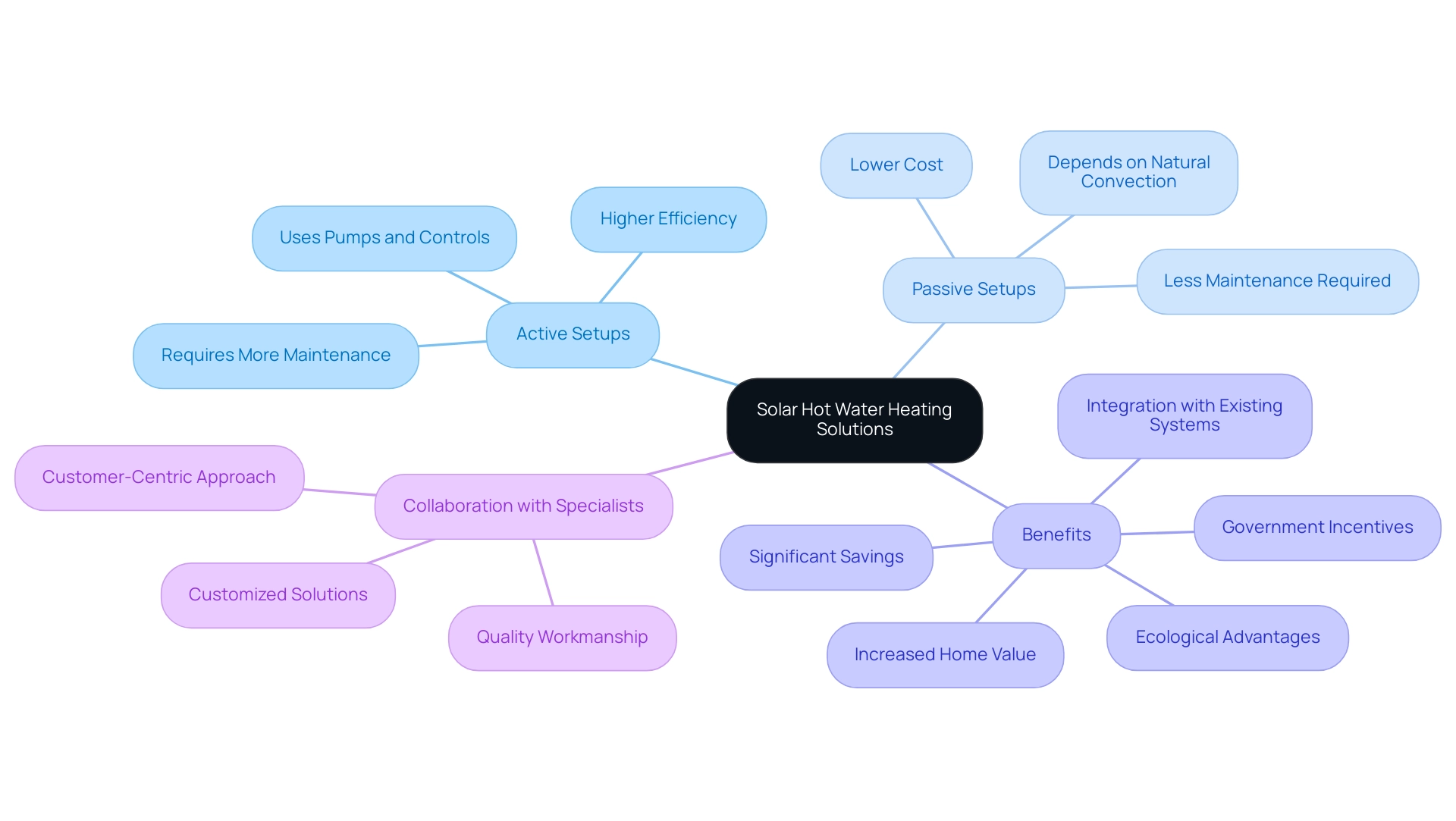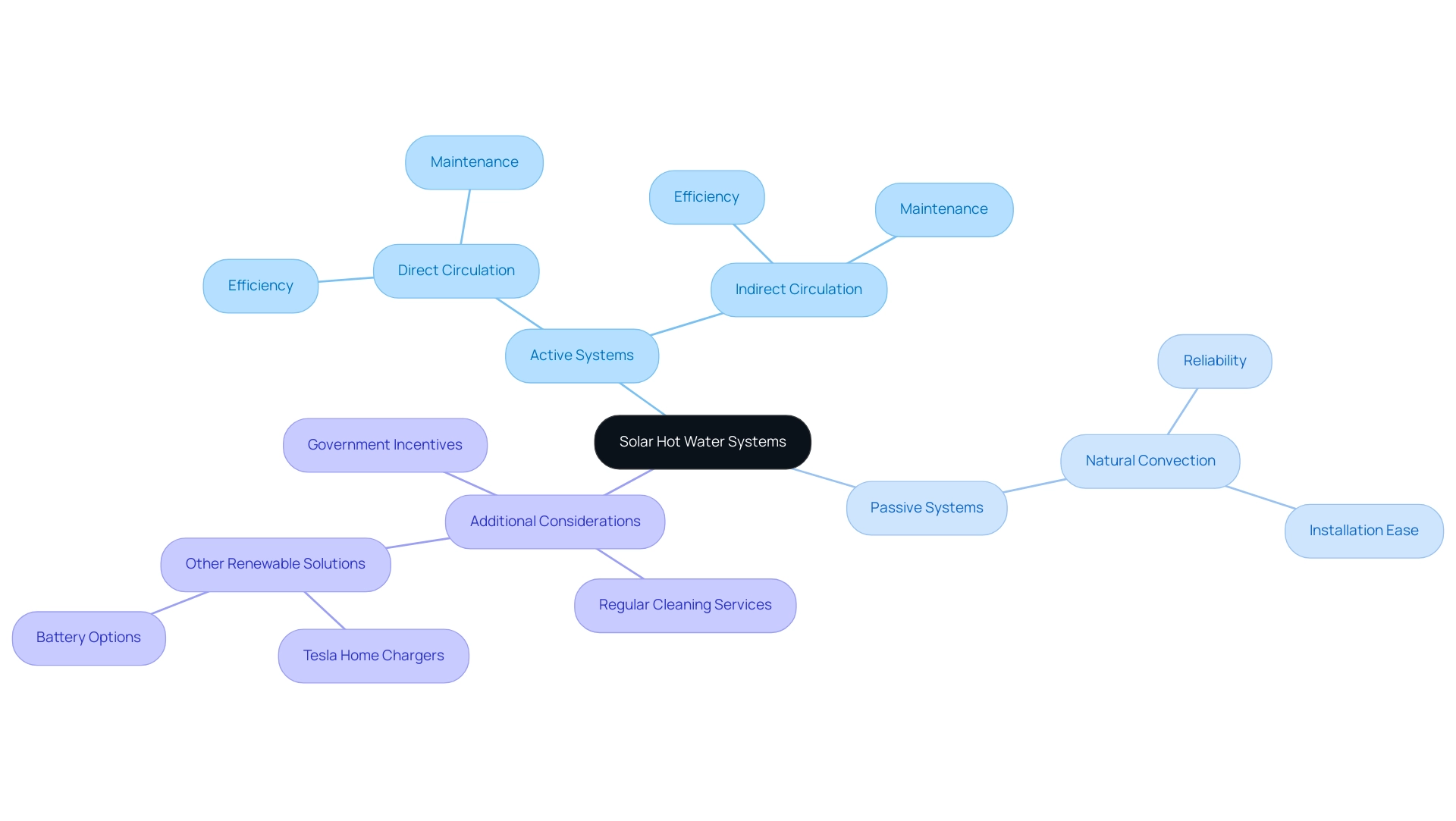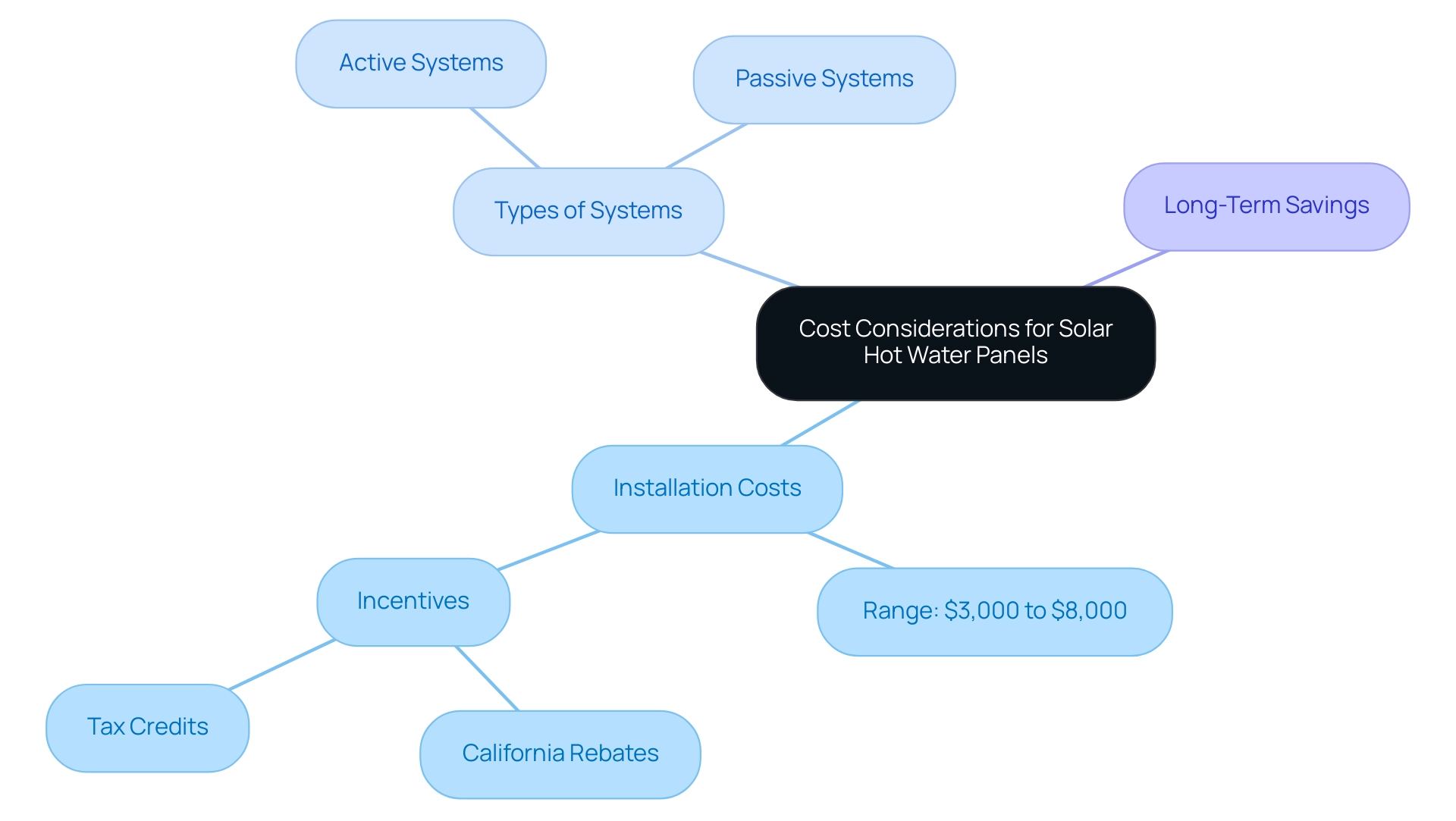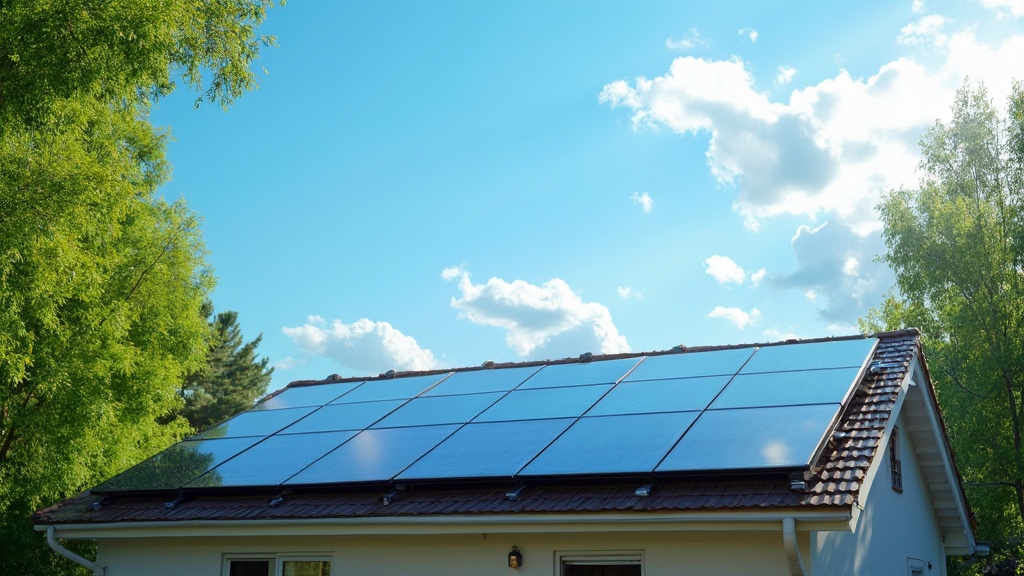Introduction
The sun has long been a source of warmth and light, but its potential as a sustainable energy solution is just beginning to shine through in many households.
Solar hot water panels are revolutionizing the way homeowners think about heating water, offering a blend of efficiency and eco-friendliness that can significantly reduce energy bills and carbon footprints.
These innovative systems capture sunlight to provide hot water for everyday needs, making them an appealing option for those looking to embrace a greener lifestyle.
With two main types of systems available—active and passive—understanding the nuances of each can help homeowners make informed decisions that align with their energy needs and local conditions.
As more families explore the benefits of solar technology, the journey toward sustainable living becomes not just a personal choice, but a collective step toward a healthier planet.
Introduction to Solar Hot Water Panels: What They Are and How They Work
Solar hot water panels are fantastic devices that capture sunlight to warm liquid for your home. These setups comprise collectors that effectively capture sunlight, combined with a storage tank to retain the heated liquid. There are two primary varieties of solar hot liquid heating:
- Active types, which use pumps to circulate fluid
- Passive types that depend on natural convection
Active setups are ideal for areas with consistent sunlight, while passive configurations are simpler and less costly to install, making them suitable for milder climates. By harnessing the sun’s power, the solar hot water panel offers an eco-friendly alternative to conventional heating methods, helping to cut down on energy bills and reduce your carbon footprint.
For example, five schools in New Zealand installed heating units for their pools, prolonging the swimming season and enhancing the temperature of the liquid. These systems varied in size from 36 to 148 square meters, with costs ranging from $10,000 to $27,000, supported by grants from EECA to help offset expenses.
Furthermore, SkyCity has improved their energy efficiency initiatives by installing 22 full-sized collectors to ‘pre-heat’ liquid used in their large kitchens, restaurants, and bathrooms. When choosing the best heater for sunlight, consider factors such as regional weather, household size, hot water needs, and the First Hour Rating (FHR), which measures the amount of hot water a heater can supply in the first hour of use.
These examples highlight not only the practical applications of sunlight technology but also the significant cost savings and environmental benefits they provide. Comprehending how these systems function is an essential phase in your journey toward adopting renewable energy in your home. With advancements in sunlight technology and increasing adoption rates, there has never been a better time to explore how solar hot water panels can benefit your household.
Practical Insights: Running Your Water Heater on Solar Power
Operating your heating system using a solar hot water panel on renewable energy can result in significant savings and ecological advantages, making it an attractive choice for environmentally aware homeowners. When evaluating a thermal heating solution, it’s crucial to examine your household’s hot liquid requirements in conjunction with the availability of a solar hot water panel based on the sunlight accessibility in your region. For example, in sunny California, many homeowners can satisfy a considerable part of their heating needs with a solar hot water panel that utilizes energy from the sun.
There are two primary categories of setups available:
- Active setups, which utilize pumps and controls to circulate liquid.
- Passive setups, which depend on natural convection.
Many of these systems, such as a solar hot water panel, can be seamlessly integrated with existing water heaters, facilitating a smooth transition to renewable energy solutions. Additionally, numerous government incentives are available to help offset installation costs, and incorporating renewable energy solutions can potentially increase your home value.
Collaborating with local solar specialists, such as Powercore Electric, guarantees you obtain customized solutions that enhance savings while aligning with your commitment to sustainability. We also provide Tesla home chargers, offering a thorough approach to efficiency. With our unparalleled quality workmanship and customer-centric approach, we’re here to assist you in transitioning to clean power that benefits both your wallet and the planet.
Start your journey to sustainable energy today!

Types of Solar Hot Water Systems: Choosing the Right One for Your Home
When discussing solar hot water panel solutions, you have two primary choices: active and passive. Active setups, which encompass both direct and indirect circulation methods, utilize pumps to efficiently move water through the solar hot water panel collectors to the storage tank. While these setups tend to be more efficient, they may require a bit more maintenance.
On the flip side, passive systems operate on the principle of natural convection, making them simpler in design and often more reliable and easier to install. Each type comes with its own set of advantages and disadvantages, influenced by factors like your local climate, budget, and available space. To find the perfect fit for your home, it’s a great idea to consult with an installation specialist.
They can provide tailored advice, ensuring you make an informed choice that not only saves you money but also contributes to a greener planet. Additionally, many homeowners can take advantage of government programs that offer incentives for heating installations, which can significantly reduce upfront costs. It’s also wise to consider regular cleaning services for your solar hot water panel to ensure optimal efficiency.
Plus, don’t forget to explore other renewable solutions, like Tesla home chargers and the best battery options for efficient energy storage, to fully optimize your home’s energy use!

Cost Considerations: What to Expect When Installing Solar Hot Water Panels
When contemplating the installation of solar hot water panels, homeowners should be aware that expenses can differ greatly depending on the kind of setup, installation intricacy, and local market circumstances. On average, anticipate spending between $3,000 to $8,000 for a complete hot water setup. However, the financial burden can be eased by taking advantage of various federal and state incentives.
For instance, California homeowners may benefit from rebates and tax credits that significantly reduce their initial investment. Furthermore, many find that the long-term savings on energy bills make this investment not only worthwhile but often leads to recouping costs within just a few years.
It’s important to note that heating technologies can be categorized into active and passive solutions:
- Active systems use pumps and controls to circulate fluid, providing consistent heating.
- Passive systems utilize natural design elements to capture and retain heat, often resulting in simpler installations.
Furthermore, incorporating solar hot water panels along with heat exchangers can additionally improve efficiency, maximizing power savings. To ensure you make an informed decision that aligns with your energy needs and sustainability goals, it’s essential to conduct thorough research and consult with professionals in the field.

Maintenance and Longevity of Solar Hot Water Panels
Maintaining your solar hot water panel is simple, particularly in comparison to conventional water heating methods. Regular maintenance is crucial; a simple yearly inspection can significantly enhance performance. This is the perfect time to check for any leaks, ensure that insulation is adequate, and thoroughly clean the collectors.
Remember, keeping your solar panels clean is vital—dust and debris can block sunlight, potentially reducing efficiency by up to 25%. In fact, data indicates that the median loss rate for photovoltaic performance is 0.75% per year, emphasizing the importance of routine cleaning. If you reside in a region with hard liquid, consider descaling to prevent mineral buildup.
With proper care, most solar hot water panel setups can last 20 years or more, making them a wise investment for eco-conscious homeowners. Innovative cleaning solutions, such as automated cleaning robots and self-cleaning coatings, can further enhance maintenance efforts. To further assist you, we have a designated area where you can upload files related to your setup for tailored advice and support.
Additionally, your installation specialist is your best resource for personalized maintenance schedules and recommendations specific to your system, so be sure to reach out to them for the best care practices. Investing in solar solutions not only helps your pocket but also contributes to a more sustainable environment, reducing your carbon footprint significantly. Plus, don’t forget to explore the local tax incentives that can enhance your investment even more!
Environmental Impact: Why Solar Hot Water Panels Matter
Solar hot water panels are essential for cutting down greenhouse gas emissions by decreasing our dependence on fossil fuels for heating. When homeowners switch to these renewable solutions, they not only lower their carbon footprints by 20-40% but also champion sustainable living. Significantly, various case studies, including one from Southern California, show that households have achieved remarkable energy savings, often surpassing 70%, after adopting solar heating solutions.
Another study from the Pacific Northwest highlights the efficiency of evacuated tube setups in cooler climates, demonstrating significant environmental impact across diverse regions. These setups are designed to conserve water, often requiring less than conventional heating methods. As more families adopt renewable energy technology, their individual choices contribute to a larger movement toward environmental protection.
Leila ABOU EL KOUROUM from the Mohammadia School of Engineers observes, ‘Therefore, it can be concluded that the systems harnessing sunlight are eco-friendly alternatives to traditional power sources and should be extensively utilized whenever possible to safeguard the environment and ensure sustainability.’ This collective transition toward renewable energy not only benefits your home but also serves as a crucial step in the battle against climate change, making the adoption of solar hot water panels not just a personal enhancement, but an essential contribution to our planet’s well-being. Additionally, the construction energy for photovoltaic water heaters is recuperated in about 13 months, emphasizing their sustainability aspect.
With the right installation angle, homeowners can maximize their solar panel output, further enhancing the efficiency of these systems and paving the way for a brighter, greener future.
Conclusion
Harnessing the power of the sun through solar hot water panels offers a remarkable opportunity for homeowners to embrace sustainable living while enjoying significant savings on energy bills. By understanding the different types of systems available—active and passive—homeowners can make informed choices that best suit their needs and local climates. These systems not only provide an eco-friendly alternative to traditional water heating but also contribute to a substantial reduction in greenhouse gas emissions.
Investing in solar hot water technology is more than just a financial decision; it’s a commitment to a healthier planet. With the potential to lower carbon footprints by 20-40% and the backing of various government incentives, the barriers to entry are lower than ever. As demonstrated by successful installations in schools and businesses, the benefits extend beyond individual households to create a collective impact that promotes environmental protection.
Regular maintenance and care can ensure the longevity of these systems, making them a wise investment for years to come. As more families turn to solar solutions, the ripple effect of these choices can help pave the way for a more sustainable future. Embracing solar hot water panels is not just about saving money; it’s about being part of a larger movement toward a cleaner, greener world. Now is the time to take action and invest in a solution that benefits both your home and the environment.


